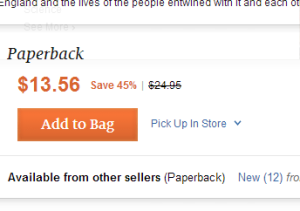Is Barnes & Noble Hurting Its Stores By Not Price-Matching Its Own Website?
See, though BN.com prominently displays the “Pick Up In Store” option right next to the “Add to Bag” button for each item, it’s only at the very bottom of the screen, below the list of stores carrying the title and in small type, that you can find the disclaimer, “Store and online prices may vary.” In fact, you may never even see this disclaimer because you don’t need to scroll down that far on the page to reserve the book.
So you could end up like Consumerist reader Tim, who was shopping on BN.com a couple weeks back when he noticed that he could reserve the books for in-store pick-up, thus assuring he’d have them in time for the holiday.
But when he arrived that the store to pick up the books, rather than being charged the $66 (including tax) he would have paid online, his purchases totaled $108.
The cashier explained that the store has to charge more because of the overhead costs associated with running a retail business. She told Tim that everyone complains about the price discrepancies but she did call over a customer service staffer to help him out while she moved on to other customers.
Tim says the CSR had basically the same explanation for the price difference, but added an interesting twist: He could just put these books back and order them to be shipped to my house for free and that way I could get the online price.
So rather than price-match its own site or have a meet-in-the-middle policy for these customers that would keep the sale with the retail store while still providing the customer some discount, Barnes & Noble would rather have its employees using their time to reshelve these books, and placing orders for customers via bn.com.
Tim pointed out this inefficiency to the CSR, who repeated the cashier’s statement that “everyone complains about this.”
This was confirmed almost immediately, as Tim was joined at the customer service desk by another customer carrying a stack of books they wanted the store to order for her through BN.com.
“She was showrooming Barnes & Noble in Barnes & Noble,” observed Tim.
Even after ordering the books for Tim, he still had to get back in the line for the cashier because he couldn’t pay for the order at the customer service desk.
“The gross inefficiency of the whole transaction was simply overwhelming,” he writes. “While both Barnes & Noble employees I worked with were very nice and sympathetic their hands were tied by not having the power to sell in-store at the online price. Also, they seemed totally beaten up by the situation as both said over and over this happens ‘all the time’ and ‘everyone complains’ about it.”
There are obviously very real explanations for why a bricks-and-mortar retailer can sometimes not price-match its own website. This is especially true for items like books, which are easily warehoused, fulfilled and shipped through the e-tail business model, but require significantly more expense, labor and floor space for retail stores.
However, we think Barnes & Noble is only hurting itself by not being fully transparent about the price difference. If it can instantly tell you whether a title is available at any particular store, it doesn’t seem like it would be that much of a stretch to list what that book is retailing for at each store.
Rather than customers who are surprised — and possibly angered — by finding out the retail/online price difference at the cash register, wouldn’t Barnes & Noble prefer to have customers arriving at their store knowing full-well what they should expect to pay when they pick up their books?
Want more consumer news? Visit our parent organization, Consumer Reports, for the latest on scams, recalls, and other consumer issues.


